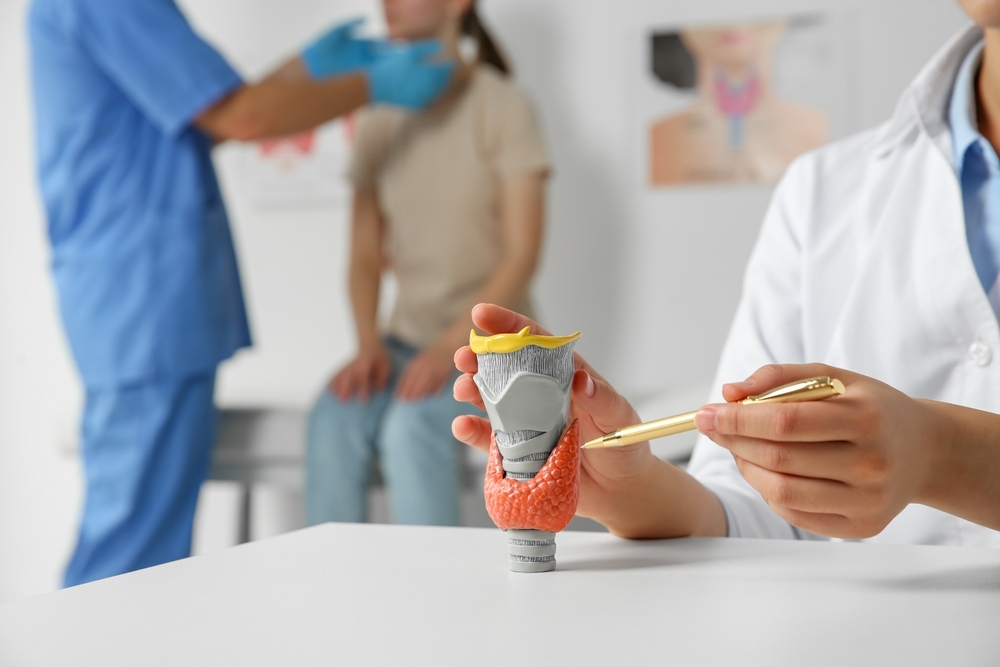
☝️ The most important facts in brief
- An endocrinologist is a specialist in hormones and glands in the human body.
- Endocrinologists treat diseases such as diabetes mellitus, thyroid problems and other hormonal dysfunctions.
- Endocrinology is a branch of internal medicine.
- The starting salary for endocrinologists is around 5,500 euros.
📖 Table of contents
An endocrinologist is a doctor who specialises in the internal glands. He treats diseases such as diabetes mellitus and thyroid problems. Endocrinologists analyse the interaction of hormones, glands and organs in the body. This also includes functional disorders of the pituitary gland, parathyroid gland, ovaries and other organs.
Are you interested in studying medicine?
We will be happy to advise you free of charge about your options for studying medicine, including advice on studying medicine in another EU country, which is fully recognised in Germany.
The role of endocrinology in modern medicine
Endocrinology is the medical speciality that relates to hormones and hormone-producing glands. Endocrinologists treat diseases such as diabetes mellitus, thyroid disorders and hormonal dysfunctions. Typical tasks include the examination of the pituitary gland, adrenal glands and thyroid gland as well as the clarification of other hormonal disorders and the development of individualised treatment plans for patients.
In recent years, the importance of endocrinology in healthcare has grown. We now know more about the connections and are aware of the major role that hormones and messenger substances play in the health of the entire body.
Diabetology as a separate speciality of endocrinology
Diabetologists work in a clearly defined sub-area of endocrinology. They specialise in the diagnosis and treatment of diabetes and associated diseases. They help diabetes patients to regulate their insulin levels and stabilise their metabolism with the appropriate measures.
Diabetologists monitor the function of the insulin-producing B cells in the pancreas and the effect that the hormone insulin has on the body. In addition to the aim of getting blood sugar under control, the Diabetology also help to improve quality of life. For example, so-called insulin pumps can be used, which saves the need for frequent injections.
Other specialised areas in endocrinology
Diabetology is not the only area in which endocrinologists can specialise. It would go beyond the scope of this article to explain them all here. We would therefore like to introduce you to three other specialisms as examples:
Reproductive medicine
Hormone disorders often affect the reproductive capacity of the human body. Ovaries and testicles can be equally affected. In many cases, hormonal imbalances can be treated well so that fertility can be restored through the changes achieved.
Thyroidology
This speciality focuses on the thyroid gland and its diseases. Endocrinologists analyse the thyroid hormone thyroxine in particular, which is released too much in the case of hyperthyroidism and too little in the case of hypothyroidism. Typical indications of thyroid dysfunction can include tiredness and obesity not caused by diet.
Metabolic endocrinology
Diseases that fall under this speciality include obesity and metabolic syndrome. Metabolic endocrinologists analyse the individual hormone effect on the metabolism. They are consulted in cases of unexplained weight loss or weight gain as well as sleep disorders that cannot be explained in any other way, which may be linked to the dysfunction of hormone-producing organs.

Various examination methods in endocrinology
There are numerous examination methods in medicine. Some of these are typical for the field of endocrinology. Blood tests, for example, are used to determine the level of a specific hormone or even several hormones and thus determine whether there is an excessive or reduced secretion of hormones.
As one of the particularly large and easily accessible endocrine glands, the thyroid gland is often examined by ultrasound. The secretion of hormones by the pituitary gland and hypophysis, on the other hand, can be easily examined using so-called stimulation tests.
Imaging procedures such as CT and MRI provide detailed information about hormone-producing organs such as the adrenal glands. A variety of hormone, glucose and metabolic tests allow the overall hormonal balance in the body to be assessed. These methods help to categorise complaints such as fatigue, obesity and metabolic disorders and possibly identify them as the expression of a hormone-related problem.
How to become a doctor specialising in endocrinology
To become a doctor specialising in endocrinology, you must first complete a medical degree. The degree programme usually lasts six years and covers the basics of medicine. You will learn all about the human body, organs and their functions.
The practical year follows the degree programme, during which you gain practical experience in various medical fields. You then take the state examination and are authorised to practise as a doctor.
It is not yet possible to specialise in endocrinology during your studies. After all, you need to have a good overview of all specialisms. Even when working as a specialised endocrinologist, you may encounter a variety of other diseases that you need to classify correctly in order to help your patients in the best possible way.
Further training as a specialist in internal medicine
You cannot become an endocrinologist straight after graduating, but must first complete specialist training as an internist. To do this, you will complete several years of further training, which usually takes five to six years. Here you will familiarise yourself with every gland in the human body and every hormone-producing organ.
The training also includes the detailed analysis of blood tests and hormone levels. You will learn how to treat conditions such as diabetes, pituitary gland dysfunction and much more. The specialist training programme concludes with an examination. After successful completion, you will be authorised to work as an internist.
Specialisation in endocrinology
During your specialist training, you will have the opportunity to specialise in certain areas such as individual organs, the nervous system or endocrinology. By acquiring certain additional qualifications, you can later work as an expert in this field or work in endocrinological research and teaching.
What salary will I receive as an endocrinologist?
As a specialised endocrinologist, you can expect an attractive salary. The starting salary is usually around 60,000 to 70,000 euros gross per year. However, the exact pay depends, among other things, on the nature of your position. For example, if you are already highly specialised in the pituitary gland and this knowledge is currently in high demand, the pay will be higher from the outset than if you have "only" completed the classic training for internists and endocrinologists.
Long-term earning potential
Your salary will continue to rise with increasing professional experience and additional qualifications. After a few years of professional experience, you can earn an income of 80,000 to 100,000 euros per year. In managerial positions, such as chief physician, salaries of up to 150,000 euros possible.
Your knowledge of messenger substances, hormones in the blood and their functions is in high demand. This also opens up lucrative opportunities in research and teaching. Your expertise will help to develop new treatment options for complex hormone disorders and improve patients' quality of life.
Free information material
Studying medicine abroad 🎉
Order your info pack now, find out more about the Studying medicine abroad and get started as a medical student!





